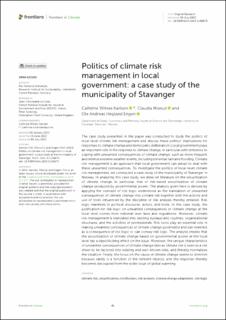| dc.contributor.author | Karlson, Cathrine Witnes | |
| dc.contributor.author | Morsut, Claudia | |
| dc.contributor.author | Engen, Ole Andreas Hegland | |
| dc.date.accessioned | 2023-09-18T14:14:59Z | |
| dc.date.available | 2023-09-18T14:14:59Z | |
| dc.date.created | 2023-06-17T12:50:01Z | |
| dc.date.issued | 2023-07 | |
| dc.identifier.citation | Karlson, C.W., Morsut, C., Engen, O.A.H. (2023) Politics of climate risk management in local government: A case study of the municipality of Stavanger. Frontiers in Climate, 5 | en_US |
| dc.identifier.issn | 2624-9553 | |
| dc.identifier.uri | https://hdl.handle.net/11250/3090171 | |
| dc.description.abstract | The case study presented in this paper was conducted to study the politics of local-level climate risk management and discuss these politics' implications for responses to climate change and democratic deliberation. Local government plays an important role in the response to climate change, in particular with reference to coping with unwanted consequences of climate change, such as more frequent and intense extreme weather events, including torrential rain and flooding. Climate risk management is an approach that local government can adopt to deal with these unwanted consequences. To investigate the politics of local-level climate risk management, we conducted a case study of the municipality of Stavanger in Norway. In analyzing this case study, we drew on literature on the securitization of climate change, in particular, that of risk-based securitization of climate change produced by governmental power. The analysis given here is derived by applying the concept of risk logic understood as the translation of unwanted consequences of climate change into climate risk together with the actions and use of tools influenced by the discipline of risk analysis thereby entailed. Risk logic manifests in political discourse, actors, and tools. In this case study, the justification for risk logic on unwanted consequences of climate change at the local level comes from national-level laws and regulations. Moreover, climate risk management is translated into existing bureaucratic routines, organizational structures, and the activities of professionals. Risk tools play an essential role in making unwanted consequences of climate change governable and can manifest as a consequence of risk logic or can convey risk logic. The analysis implies that the securitization of climate change based on governmental power at the local level has a depoliticizing effect on the issue. Moreover, the unique characteristics of unwanted consequences of climate change fade as climate risk is seen as a risk driver to be factored into existing and well-known risks, and thereby normalizes the situation. Finally, the focus on the cause of climate change seems to diminish because safety is a function of the referent objects, and the response thereby becomes decoupled from the wider issue of global warming. | en_US |
| dc.language.iso | eng | en_US |
| dc.publisher | Frontiers Media S.A | en_US |
| dc.rights | Navngivelse 4.0 Internasjonal | * |
| dc.rights.uri | http://creativecommons.org/licenses/by/4.0/deed.no | * |
| dc.subject | klimaendringer | en_US |
| dc.subject | politikk | en_US |
| dc.subject | global oppvarming | en_US |
| dc.subject | Stavanger kommune | en_US |
| dc.title | Politics of climate risk management in local government: A case study of the municipality of Stavanger | en_US |
| dc.type | Peer reviewed | en_US |
| dc.type | Journal article | en_US |
| dc.description.version | publishedVersion | en_US |
| dc.rights.holder | © 2023 Karlson, Morsut and Engen | en_US |
| dc.subject.nsi | VDP::Samfunnsvitenskap: 200::Statsvitenskap og organisasjonsteori: 240 | en_US |
| dc.source.journal | Frontiers in Climate | en_US |
| dc.source.issue | 5 | en_US |
| dc.identifier.doi | 10.3389/fclim.2023.1136673 | |
| dc.identifier.cristin | 2155450 | |
| cristin.ispublished | true | |
| cristin.fulltext | original | |
| cristin.qualitycode | 1 | |

